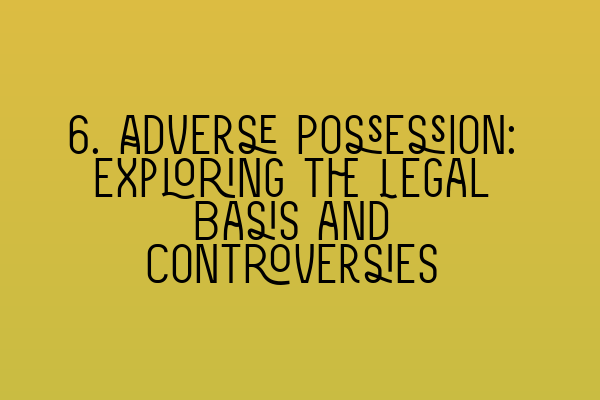Adverse possession is a legal concept that may seem unfamiliar to many, but it has significant implications in property law. It refers to the acquisition of rights to real property through continuous, open, and notorious possession of the property, without the permission or consent of the true owner. In simple terms, it allows a person to claim ownership over a piece of property that they have been using and occupying as their own for a certain period of time, typically ranging from 10 to 20 years, depending on the jurisdiction.
As a solicitor at SQE Property Law & Land Law, I often encounter cases involving adverse possession, and its legal basis and the controversies surrounding it. In this blog post, I will delve into the legal aspects of adverse possession, discuss some of the controversies associated with it, and shed light on how it affects property owners and the legal system as a whole.
1. The Legal Basis of Adverse Possession
The legal basis for adverse possession can be traced back to the common law principle of “use it or lose it.” The idea is that if the true owner of a property fails to assert their rights and protect their interest by taking legal action against the adverse possessor within the specified time period, they may lose their ownership rights.
In addition to the common law principle, adverse possession is also supported by statutory law in many jurisdictions. Legislation, such as the Limitation Act 1980 in the UK, sets out the specific requirements and time periods for adverse possession claims. These statutes provide a framework for individuals seeking to acquire ownership through adverse possession.
2. Controversies Surrounding Adverse Possession
While adverse possession serves important legal and social purposes, it is not without its controversies. Here, I will discuss some of the key controversies associated with this legal concept:
a. Ethical Concerns
One of the main controversies surrounding adverse possession revolves around its ethical implications. Critics argue that it allows individuals to gain ownership of property through an unfair and morally questionable process. They argue that it is unjust for someone to benefit from another person’s negligence or lack of action.
On the other hand, proponents of adverse possession argue that it promotes efficient land use and prevents valuable resources from lying idle. They assert that people who actively use and improve a property should be rewarded with ownership rights rather than penalized for the true owner’s inaction.
b. Impact on Property Owners
Another controversy arises from the potential impact adverse possession can have on property owners. Imagine discovering that someone has been using and claiming ownership of a portion of your property for years without your knowledge or consent. It can be a distressing experience, shattering the peace of mind that comes with being a property owner.
However, it is important to note that adverse possession is not automatic; it requires meeting specific criteria and going through a legal process. Property owners also have the opportunity to protect their rights by taking timely legal action against adverse possessors. Additionally, title insurance and regular property inspections can help identify potential adverse possession claims before they escalate.
c. Potential for Fraud
There is also a risk of fraud associated with adverse possession. Unscrupulous individuals may purposefully trespass on others’ properties and attempt to gain ownership through adverse possession, knowing that the true owner is either absent or unaware of their activities.
However, legal systems have safeguards in place to mitigate the risk of fraud. The burden of proof lies with the adverse possessor, who must demonstrate compliance with all legal requirements for adverse possession. Courts carefully scrutinize such claims to ensure that genuine cases are given due consideration while fraudulent attempts are swiftly dismissed.
3. The Future of Adverse Possession
As property laws and societal attitudes continue to evolve, the concept of adverse possession may face changes in the future. Some jurisdictions have already implemented reforms to address the controversies and strike a balance between fairness and efficiency.
To stay updated on the latest developments in property law, it is crucial for aspiring solicitors to gain a solid understanding of adverse possession and its application in different jurisdictions. SQE 1 Practice Exam Questions and SQE 1 Practice Mocks FLK1 FLK2 offered by SQE Property Law & Land Law are excellent resources to enhance your knowledge and prepare for the SQE 1 exams.
For those already in the legal profession, SQE 2 Preparation Courses and SQE 1 Preparation Courses provided by SQE Property Law & Land Law can help you further develop your expertise in property law and stay ahead of the game.
Lastly, it is essential to stay informed about SRA SQE Exam Dates to plan your examination strategy effectively and make progress towards your career goals.
Adverse possession may be a complex and controversial concept, but it is an integral part of property law. By understanding its legal basis and controversies, legal professionals can navigate the intricacies of this area of law and provide valuable guidance to clients.
